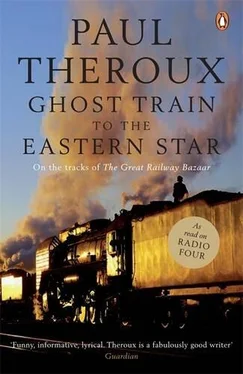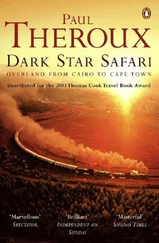In the dark early morning, I met my guide, Sergei, and his translator, Yelena. They'd brought a friend, Viktor Shmirov, an authority on the gulag system and one of its historians. We got into Sergei's car and began driving on the white streets of packed snow, under sulfurous streetlamps.
"Why does the guidebook write that about Perm?" Sergei asked when I mentioned the jibe. "This city is full of history. Dostoyevsky stopped here on his way to Omsk. The Diaghilev family is from here. Chekhov of course — this is the setting for Three Sisters. And Pasternak's book. The city is full of history!"
Dostoyevsky was on his way to prison and had spent only one night here. Sergei Diaghilev fled the city and spent his life in Paris as a balletomane. For Chekhov it was the epitome of stifling provincial cities ("When can we go to Moscow?" the three sisters keep moaning), and Pasternak had been regarded as a literary pariah until fifteen years ago.
I mentioned that Three Sisters depicted Perm unfavorably, the stifled sisters longing to leave for Moscow.
"Because Chekhov had a problem," Sergei said. Sergei's English was not bad, but he preferred to speak Russian. Yelena sat behind me, translating. "He was turned away from a building because he was wearing the wrong clothes. He never forgave them for this."
This episode is not mentioned by any of Chekhov's biographers, only the fact that in 1890 he arrived by river in Perm at two o'clock one April morning and left the same day at six in the evening, on a train heading east. He was on his long Siberian trip — eighty-one days from Moscow to Vladivostok, on his way to the penal settlement at Sakhalin. Still, sixteen hours in Perm was enough for a genius like Chekhov to sum up the city as stifling.
"It's like this," Sergei said. "What if you went to a city and found a cockroach in your soup?" A big beefy man, he was hunched over the wheel, steering us through the snow. He turned heavily in his seat and faced me, his hands still on the wheel of the slowly moving car. "You wouldn't like that city, would you? You'd always remember it. 'Ah, Perm, that's where I had the cockroach in my soup!'"
"But we have no cockroaches," Yelena said.
"Five years ago, all the cockroaches left Perm," Sergei said. "Was it radiation? Did they sense trouble coming? The professors can't answer this question."
"And now we are passing Bashaya Smirti," Viktor said.
"The Tower of Death," Yelena said and pointed up ahead at a wide gray tower, like a silo with a sloping roof, attached to a gray, ecclesiastical-looking building pierced by small windows.
"There was a wave of repression in the early 1950s," Viktor said as we made a circuit around the grim-looking tower. "The Tower of Death was built then for the KGB. People were taken here for interrogation."
I asked who those suspects might be.
"People regarded as 'cosmopolitan,'" he said. "Westernized. Not patriotic. Also what were known as 'left radicals.' Anti-Stalinists."
The terrifying tower loomed like an oversized crematorium near the center of Perm, so I asked the obvious question: "Did people in Perm call it the Tower of Death?"
"They didn't say it out loud. They whispered it," Viktor said. "Under Khrushchev they said it a little louder."
I mentioned that my favorite writer about the gulag, a man who had been extensively interrogated, was Varlam Shalamov, the author of Kolyma Tales.
"This is Shalamov's centenary," Viktor said, brightening. "His father was a priest, but Shalamov wasn't religious at all. It's amazing that someone with such a huge experience of prison life didn't become a Christian."
"Unlike Solzhenitsyn."
"Yes, and unlike Solzhenitsyn, he did twenty-seven years in Siberia. At the end, he lived in great poverty in Moscow. He died in obscurity."
Solzhenitsyn was the West's most famous zek, or prisoner. Yet in her exhaustive history of the prison system, Gulag, Anne Applebaum writes that his prison time was not onerous: "[Solzhenitsyn] was an unremarkable prisoner. He flirted with the authorities, served as an informer before seeing the light, and wound up working as a bricklayer." And Shalamov's Kolyma Tales, which she praises, she also describes as "among the bitterest in the entire camp genre."
We had left the outskirts of Perm and were headed northeast, into the snow and pine forests along an unplowed road. Aside from a few cars and heavy trucks, there was almost no traffic. The early morning darkness had lifted; we were traveling through slanting snowfall under a low gray sky.
"I want to tell you a story about the organs of power," Viktor said, Yelena translating. "I once had a chance to interview a peasant woman in the northern Perm region. She told me she had never left her village, except once. She had gone to Chernaya, a biggish town. She was very impressed because it was so beautiful. She was sitting quietly, admiring the place, when she heard someone say, 'Apoga is coming.'
"She knew the name. Apoga was the chairman of the Emergency Committee of the Cheka."
The Cheka was one of the previous incarnations of the KGB, now known as the FSB. It has undergone nineteen name changes since 1919, yet it is the same organization, devoted to spying, torture, and murder.
"Apoga was a frightening name to the woman. And the idea of seeing him was just terrible. Everyone was scared by the prospect of seeing this man. The woman left as soon as she could — went back to her village and never left again." Viktor raised his hands. His face was fixed in an expression of helpless pain. "People could be imprisoned for nothing. That man's name, Apoga, represented terror and fear."
I said, "The paradox is that at exactly the same time — the 1950s — we had McCarthy in the U.S. persecuting people for sympathizing with the Soviet Union."
Sergei was clucking " Nyet, nyet, nyet" before I could finish. "I've been to America," he said. "I know about McCarthyism. The problems were not on the same scale."
I had to agree, though the motives, the witch-hunts, the betrayals, the stink of fear — of ruined lives and lost jobs and disgrace — that hung over McCarthyism were similar.
"Here's a story," Sergei said. "Viktor says people were afraid. It's true. I know it from my own family. My grandmother's family was from Kirov" — Kirov was on the railway line, about eight hours west of Perm—"and they had eleven children, seven girls, four boys. My grandmother was considered educated, because she'd graduated from primary school with honors."
Yelena said, "Is also a joke, Paul."
"I get it." I also understood that he kept referring to his grandmother as babushka.
"Her father was a well-known butcher. This man was strong physically, a muscular man. Fifty years later he was still remembered in this province. At the time of the revolution," said Sergei, "my grandmother was seventeen. She got married at nineteen, and for eight years all was well. They were in that remote place. The secret police couldn't reach them.
"In the 1920s, Stalin wanted collectivization, so they came to my grandparents. Her father the butcher was a kulak" — a rich peasant, or one defying authority. "He had a beautiful house that he'd built himself. The inspector wanted the house for his own family. The house was very dear to the butcher.
"'Go to Siberia,' the government inspector said.
"What? Until then he had never worried about the powers of government. He was so upset he just lay down and died of a heart attack.
"His two sons — my great-uncles — ran away to fight against this unfair government. My grandmother stayed in the village. But she was scared. She knew the police were looking for her two brothers. At the same time, she was giving bread to her brothers when they sneaked home. The special police wanted to kill them. This was around 1930 or '31. A few years later they were found and shot by the police.
Читать дальше












